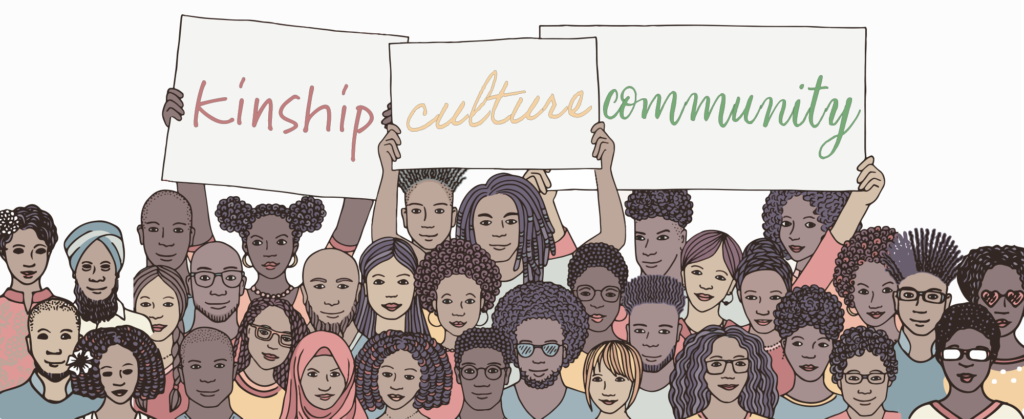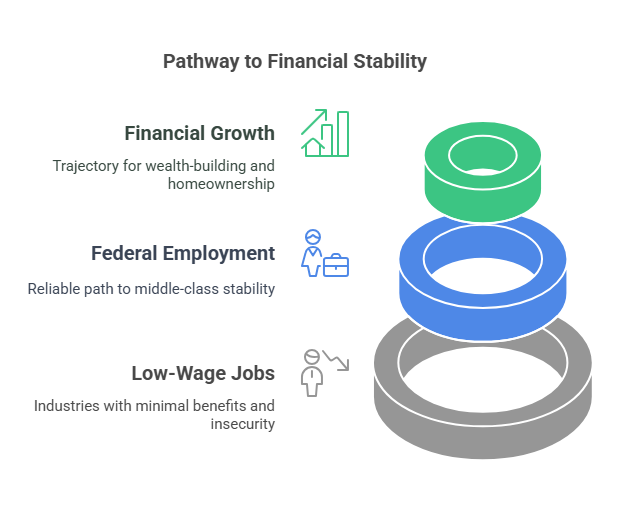
Introduction
Black Wealth Under Fire: The Fight to Protect Federal Jobs
For decades, the federal government has been one of the most significant employers of Black Americans, providing stable, well-paying jobs that were often unavailable in the private sector. During times of widespread employment discrimination, federal jobs became a lifeline for Black workers, offering opportunities for career growth, economic stability, and pathways to the middle class.
Unlike the private sector—where hiring discrimination, wage disparities, and a lack of advancement opportunities have historically been major barriers—federal employment has often been more inclusive.
Black workers have been able to secure positions with benefits, pensions, and long-term financial security, allowing them to support their families, invest in their communities, and build generational wealth.
However, despite the role of the federal government in advancing economic stability for Black Americans, recent policy changes under the Trump administration pose a direct threat to Black Wealth and Federal Jobs. Cuts to federal jobs, rollbacks of diversity initiatives, and downsizing in key agencies are raising concerns about the future of Black representation in the federal workforce.
This blog will explore three key areas:
1️⃣ The significant representation of Black workers in the federal government and how this trend developed.
2️⃣ The impact of federal jobs on Black economic stability and how they have helped build Black wealth.
3️⃣ How recent policies under the Trump administration are threatening these opportunities and what this means for the Black community moving forward.
1. The Federal Workforce and Black Representation
📌 Black Wealth Under Fire: The Fight to Protect Federal Jobs
Black workers make up 19% of the federal workforce, compared to 13% of the overall U.S. workforce. This overrepresentation is not by accident—it’s a result of historical circumstances and systemic barriers that pushed Black workers toward government jobs when private-sector opportunities were largely closed off to them.
During the Jim Crow era and beyond, private-sector discrimination made it difficult for Black workers to secure stable employment, receive promotions, or gain access to high-paying industries. In contrast, the federal government became a major employer that offered protections against racial bias—especially after the Civil Rights Movement led to anti-discrimination policies.
For generations, Black families have relied on federal jobs as a way to:
✅ Break into the middle class.
✅ Access benefits like healthcare and retirement pensions.
✅ Secure financial stability even during economic downturns.
📌 Key Federal Agencies with Strong Black Representation
Certain federal agencies have historically provided strong representation and employment opportunities for Black workers.
🔹 Social Security Administration (SSA) – Known for employing a high percentage of Black workers, offering administrative and technical positions with room for growth.
🔹 Internal Revenue Service (IRS) – Has been a major employer of Black professionals in finance, auditing, and administrative roles.
🔹 Veterans Affairs (VA) – Employs a significant number of Black workers in healthcare, administration, and outreach programs for veterans.
📌 The Importance of Federal Jobs in Black Economic Stability
The benefits that come with federal employment have helped Black families achieve long-term financial security in ways that many private-sector jobs do not.
✅ Higher Job Security – Unlike private companies that are prone to layoffs, federal jobs provide stability, allowing employees to build long-term careers.
✅ Retirement Benefits & Pensions – Black federal workers have access to pension plans and 401(k) contributions, ensuring financial stability in retirement.
✅ Healthcare & Family Benefits – Federal jobs provide better health insurance, parental leave, and disability coverage, which helps Black families build economic resilience.
Because of these factors, federal jobs have served as a crucial bridge to economic advancement for Black Americans—but recent policy changes threaten to reverse decades of progress.

2. How Federal Jobs Have Helped Build the Black Community
📌 Pathway to the Middle Class
For decades, federal jobs have been one of the most reliable paths to the middle class for Black Americans. Unlike the private sector, which historically denied opportunities for career advancement, federal employment provided a clear trajectory for financial growth, homeownership, and wealth-building.
🔹 Escaping Low-Wage Employment: Many Black families moved into stable, well-paying jobs in federal agencies, escaping industries that offered low wages, minimal benefits, and job insecurity.
🔹 Real Stories of Success: Black retirees from the Social Security Administration, IRS, and Veterans Affairs frequently share stories about how their federal jobs:
- Provided financial security and a steady paycheck.
- Allowed them to purchase homes and build generational wealth.
- Helped them put their children through college without taking on crippling debt.
🔹 Retirement Security: Unlike many private-sector jobs, federal employment includes pension plans, ensuring Black workers do not struggle financially after retirement.

📌 Economic Stability and Growth
One of the most significant impacts of federal employment on the Black community has been wage equality.
✅ Closing the Wage Gap: Studies show that Black workers earn higher wages in the public sector than they do in private-sector jobs with similar qualifications.
✅ Union Protections: Unlike the private sector, federal unions provide job security, fair wages, and merit-based promotions—preventing racial bias in hiring and pay decisions.
✅ Career Longevity & Economic Resilience: Black federal employees tend to stay in their jobs longer, creating financial stability that helps support families and local economies.
📌 Community Development
Federal jobs don’t just benefit individuals—they uplift entire Black communities through economic activity and local investments.
💡 Black Federal Workers Help Fund Local Economies:
- Many own homes, contributing to property taxes, school funding, and neighborhood revitalization.
- With stable salaries, Black workers support Black-owned businesses, creating a cycle of reinvestment in Black communities.
- Philanthropy and mentorship—Many federal workers give back through scholarships, community programs, and mentorship initiatives.
🚀 For generations, federal jobs have not only helped individual Black families achieve financial security but have also strengthened the Black middle class as a whole. However, these gains are now at risk.

3. The Trump Administration’s Attack on Federal Jobs and DEI Policies
Despite the importance of federal jobs in creating economic opportunities for Black Americans, recent policy changes under the Trump administration have put these opportunities in jeopardy.
📌 Workforce Layoffs and Downsizing
Recent actions have directly impacted thousands of Black federal workers:
❌ IRS Layoffs: The IRS announced layoffs of 7,000 probationary employees, many of whom are Black workers in entry-level positions. This decision significantly reduces opportunities for financial growth in Black communities.
❌ Federal Hiring Freezes & Cuts:
- Many agencies have been ordered to cut staff, limiting job openings for Black professionals looking for federal employment.
- Black applicants are disproportionately affected, as federal agencies historically provided opportunities where the private sector fell short.
📌 Elimination of DEI Programs
Under Trump, there has been an aggressive push to dismantle diversity, equity, and inclusion (DEI) initiatives in federal employment.
🔹 Revoking DEI Programs: Executive orders have eliminated initiatives that were previously promoted:
- Black hiring and leadership development in federal agencies.
- Retention programs aimed at helping underrepresented employees advance in their careers.
🔹 Targeting Diversity Roles:
- Federal agencies have been instructed to eliminate DEI-related positions, removing programs that supported Black career development.
- These changes reverse decades of progress in making government jobs more accessible to Black professionals.
📌 Long-Term Consequences for the Black Community
If these policies continue, the long-term consequences could reverse decades of economic progress for Black Americans.
❗ Widening the Racial Wealth Gap: Without stable federal jobs, Black families could lose economic ground, increasing wealth disparities.
❗ Fewer Black Leaders in Government: Without DEI programs, Black representation in senior roles will decline, making it harder for younger generations to advance.
❗ Loss of Financial Security for Future Generations: Fewer federal jobs mean less access to homeownership, retirement benefits, and generational wealth-building opportunities for Black families.
The attack on federal jobs and DEI policies is not just about employment—it’s about the future of Black economic stability in America.
Up next, the conclusion will discuss how we can fight back, protect Black workers, and ensure federal jobs remain a pathway to economic empowerment.
Conclusion
For generations, federal jobs have been a pillar of Black economic empowerment, providing stable careers, fair wages, and opportunities for upward mobility that were often denied in the private sector. These jobs have helped Black families escape low-wage employment, build generational wealth, and invest in their communities, making them one of the most critical factors in closing the racial wealth gap.
However, recent policy shifts under the Trump administration pose a serious threat to these gains. Mass layoffs, hiring freezes, and the dismantling of DEI initiatives are putting Black workers at risk, potentially reversing decades of economic progress. These actions don’t just affect individuals—they weaken entire Black communities by reducing access to stable employment and limiting career advancement opportunities for future generations.
How You Can Take Action
🛑 Stay Informed: Keep track of policy changes that affect federal jobs and Black workers. Knowledge is power, and understanding these shifts is the first step in pushing back.
📢 Advocate for Fair Policies: Support legislation and initiatives that protect federal employment opportunities for marginalized groups. Reach out to lawmakers, join advocacy groups, and amplify conversations about workforce equity.
🤝 Support Black Federal Workers: Whether through community organizing, economic initiatives, or voter engagement, we must fight to protect the roles that have historically empowered Black professionals.
🚀 Final Motivation: Protecting federal job opportunities isn’t just about employment—it’s about securing economic stability for Black families and communities. The fight for equitable employment in the federal sector is a fight for long-term financial security, generational wealth, and Black economic power. Let’s stay informed, stay engaged, and ensure these opportunities remain available for the next generation! 💪🏾🔥
FAQ: The Role of Federal Jobs in Black Economic Empowerment
1. Why do Black workers make up a large percentage of the federal workforce?
📌 Black workers represent 19% of the federal workforce, compared to 13% of the overall U.S. workforce. This overrepresentation is largely due to historical discrimination in the private sector, which pushed Black professionals toward government jobs that provided stability, fair wages, and career growth opportunities.
2. How have federal jobs helped build Black wealth?
📌 Federal jobs have provided a pathway to the middle class by offering:
✅ Higher wages and job security compared to private-sector employment.
✅ Pension plans and retirement benefits, ensuring long-term financial stability.
✅ Access to homeownership and education funding, enabling wealth-building for future generations.
3. How is the Trump administration threatening federal jobs for Black workers?
📌 Recent policies have weakened Black representation in the federal workforce through:
❌ Layoffs and downsizing, such as the IRS cutting 7,000 probationary jobs.
❌ Elimination of DEI programs, which supported Black hiring and leadership advancement.
❌ Hiring freezes, making it harder for Black workers to enter or advance in government jobs.
4. What are the long-term effects of these policy changes on Black communities?
📌 If these policies continue, they could:
❗ Widen the racial wealth gap by cutting off access to stable, well-paying jobs.
❗ Reduce Black leadership in government, limiting representation at decision-making levels.
❗ Make financial security harder to achieve, impacting homeownership, savings, and retirement for Black families.
5. What can we do to protect Black federal jobs?
📌 To defend these opportunities, we must:
✅ Stay informed about policy changes affecting federal employment.
✅ Advocate for fair hiring policies and protections for marginalized workers.
✅ Support Black workers and federal unions that fight for job security and workplace equity.
🚀 Federal jobs are not just about employment—they are about economic empowerment for Black communities. Protecting these jobs means protecting our future! 💪🏾🔥
